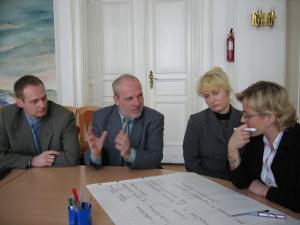World Water Day's theme this year is water cooperation, a complex but achievable ambition. IRC's work on Learning Alliances provides some useful pointers on what (and how long) it takes.
Published on: 22/03/2013
When you turned on your tap today, were you surprised that water came out? For many households in the developing world, it's not a given. The 22nd of March is World Water Day, which is celebrated globally as a way to focus attention on the importance of freshwater and advocating for the sustainable management of freshwater resources.
This year the theme is water cooperation. Cooperation is one of the key factors to sustainable and equitable access to safe water, sanitation and hygiene for all. A multi-stakeholder approach is increasingly seen as a way forward. It sounds sensible to try to involve a range of people that represent the system you are trying to change. However, facilitating such a process is challenging. It involves working with all the complexities of how humans interact and taking into account cultural, social, political environmental and economic factors that may influence efforts to change the status quo.
A multi-stakeholder approach is increasingly seen as the way forward. But, facilitating a process that involves a range of people that represent the system you're trying to change is not easy.
At the UN Water conference, IRC shared experience on how to make water cooperation happen in cities, drawing lessons from the SWITCH project. SWITCH centred on cooperation and encouraging new ways of collaboration in the search for new solutions to pressing urban water management issues. In 12 cities around the globe, the project explored what was needed for a transition to more sustainable urban water management through a combination of research, demonstration activities, multi-stakeholder learning and training and capacity building. City learning alliances were a central to testing innovations and scaling them up.
Learning alliances: Platforms for change
Learning alliances are connected multi-stakeholder platforms, created at key institutional levels (typically national, intermediate/district and local/community). Such alliances bring together representatives from government, civil society, universities and other research institutions and the private sector to undertake joint research, search for solutions, and apply them at scale. Learning Alliances are designed as platforms for change – bringing key stakeholders together to scale up success stories in water, sanitation and hygiene education. They are action-orientated forums where research results are shared with policy makers and programme managers, who make themselves accountable to communities, judged by real-life results.
Winning the engagement of key stakeholders in each city was central to making the shift towards more sustainable and coordinated urban water management. But encouraging people to work together in new ways also required skilful facilitation, sustained effort, time, focus and commitment.
The SWITCH project has been a rich learning ground about multi-stakeholder learning and change at individual, organisational and city level. A book called SWITCH in the City: putting urban water management to the test contains reflections on lessons and outcomes, a collection of case studies and learning alliance facilitation guidelines.
The presentation at the UN Water Conference highlights some of the key lessons on city learning alliances in SWITCH and various tools for enhancing cooperation in learning alliances, including visioning and participatory strategic planning, facilitating communication, and process documentation.
Conversations towards mutual understanding and collaboration
In learning alliances, conversation and dialogue are both the fundamental mode and main tool for transformational work. The diversity of stakeholders involved means that there are also inherently diverse values, interests, language and world views and possible conflicting interests. On the positive side, though, it also means multiple sources of information, experience and multiple users for it. So, a great potential for new insights, joint learning and collaboration. But, it was challenging to reconcile differences in culture, working methods and disciplines of city alliance members. The conference produced a nice document on lessons on key lessons learnt on water cooperation (scroll down for the document).
One of the lessons relating to successful communication in learning alliances is that it is important to help members develop a common understanding of the issues at hand and a shared vocabulary to support the process of moving beyond a platform for exchange towards collaborative action.

Keeping water flowing for generations to come
Making clean water available for everyone forever, is a challenge that need to be prioritised beyond this one-day celebration. IRC believes that turning on a working tap should not be a surprise, neither a cause for celebration. In the words of our Director Nico Terra: "The sector should go beyond just delivering hardware (often as a gift) and first time access to seeing hardware as a first step to working together in achieving a sustainable and good quality service, and Learning Alliances is one way. Aligning and harmonising the activities of different actors at national and decentralised levels towards nationally defined sector priorities is a must”.
At IRC we have strong opinions and we value honest and frank discussion, so you won't be surprised to hear that not all the opinions on this site represent our official policy.